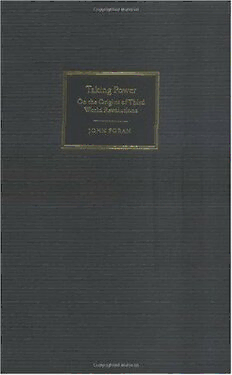
Taking Power: On the Origins of Third World Revolutions PDF
Preview Taking Power: On the Origins of Third World Revolutions
This page intentionally left blank Taking Power TakingPoweranalyzesthecausesbehindsomethreedozenrevolutionsin theThirdWorldbetween1910andthepresent.Itadvancesanewthe- orythatseekstointegratethepolitical,economic,andculturalfactors thatbroughttheserevolutionsabout,andthatlinksstructuraltheorizing withoriginalideasoncultureandagency.Itattemptstoexplainwhyso fewrevolutionshavesucceeded,andsomanyhavefailed.Thebookis dividedintochaptersthattreatparticularsetsofrevolutions:thegreat socialrevolutionsofMexico1910,China1949,Cuba1959,Iran1979, andNicaragua1979;theanticolonialrevolutionsinAlgeria,Vietnam, Angola,Mozambique,andZimbabwefromthe1940stothe1970s;the reversedrevolutionsofIran(1951–53),Guatemala(1944–54),Bolivia (1952–64),Chile(1970–73),Jamaica(1972–80),Grenada(1979–83), andNicaragua(1979–90);failedrevolutionaryattemptsinElSalvador, Peru, and elsewhere; political revolutions in the Philippines, South Africa, and elsewhere. It closes with speculation about the future of revolutionsinanageofglobalization,withspecialattentiontoChiapas, thepost-September11world,andtheglobaljusticemovement. is Professor of Sociology at the University of Cali- fornia, Santa Barbara, where he is also involved with the programs on Islamic and Near Eastern Studies, Latin American and Iberian Studies, and Women, Culture, and Development. His books include FragileResistence:SocialTransformationinIranfrom1500totheRevolu- tion (1993), A Century of Revolution: Social Movements in Iran (1994), andTheorizingRevolutions(1997). Taking Power On the Origins of Third World Revolutions John Foran cambridge university press Cambridge,NewYork,Melbourne,Madrid,CapeTown,Singapore,SãoPaulo Cambridge University Press TheEdinburghBuilding,Cambridgecb22ru,UK PublishedintheUnitedStatesofAmericabyCambridgeUniversityPress,NewYork www.cambridge.org Informationonthistitle:www.cambridge.org/9780521620093 © John Foran 2005 Thispublicationisincopyright.Subjecttostatutoryexceptionandtotheprovisionof relevantcollectivelicensingagreements,noreproductionofanypartmaytakeplace withoutthewrittenpermissionofCambridgeUniversityPress. Firstpublishedinprintformat 2005 isbn-13 978-0-511-12723-6 eBook(EBL) isbn-10 0-511-12723-5 eBook(EBL) isbn-13 978-0-521-62009-3 hardback isbn-10 0-521-62009-0 hardback isbn-13 978-0-521-62984-3 paperback isbn-10 0-521-62984-5 paperback CambridgeUniversityPresshasnoresponsibilityforthepersistenceoraccuracyofurls forexternalorthird-partyinternetwebsitesreferredtointhispublication,anddoesnot guaranteethatanycontentonsuchwebsitesis,orwillremain,accurateorappropriate. Nobookcaneverconveythegreatnessofapeopleinrevolt. EnriqueOltuski,VidaClandestina: MyLifeintheCubanRevolution, translatedbyThomasandCarolChristensen (NewYork:Wiley,2002),xxii v Contents Listoffigures page x Listoftables xi Acknowledgments xii Introduction 1 PartOne Perspectives 1 Theorizingrevolutions 5 Definingrevolution 6 Historicalperspectivesonrevolutions 8 AtheoryofThirdWorldsocialrevolutions 18 Themethodofstudyingrevolutions 24 PartTwo Revolutionarysuccess 2 Thegreatsocialrevolutions 33 Mexico’sunfinishedrevolution,1910–20 34 Thelongestrevolution:China,1911–49 46 Themakingofarevolution:Cuba,1953–59 57 TheSandinistasynthesisinNicaragua,1977–79 65 Iran,1977–79:asurprisingprototypefortheThirdWorld 74 Conclusion:theroutetosocialrevolution 87 3 Theclosestcousins:thegreatanti-colonialrevolutions 88 TheBattleofAlgeria,1954–62 91 TheAngolanRevolution,1960s–1975:fromliberation movementtocivilwar 104 Mozambique,1960s–1975:theadvantagesofrelative unity 115 Zimbabwe,1960s–1980:anti-racistrevolution 123 Vietnam,1945–75:thethreerevolutions 131 Conclusion:theanti-colonialvariant 145 vii viii Contents PartThree Revolutionaryfailure 4 Thegreatesttragedies:reversedrevolutions 151 PartOne:therisetopowerofrevolutionarymovements 153 Bolivia1952:asuddenrebellion 153 TheChileanpathtorevolution,1970 158 Grenada’sswiftsuccess,1979 163 Iran1951,Guatemala1944,andJamaica1972:twoelections andanuprising 167 PartTwo:fallingfrompower 169 Boliviaafter1952 170 Chile1973 174 Grenada1983 181 Nicaraguainthe1980s 190 Iran1953,Guatemala1954,andJamaica1980:twocoupsand anelection 196 Conclusions:successandfailureinoneact 199 5 Thegreatcontrasts:attempts,politicalrevolutions, andnon-attempts 205 Attemptedrevolutions 206 ElSalvador’snearrevolution 206 TheSenderoLuminosoinPeru 209 China,1989 211 Algeriainthe1990s 213 Guatemalasincethe1960s,Argentinainthe1970s,andthe Philippinesafter1986 214 Acomparativeanalysisofattempts 216 Alookatpoliticalrevolutions 221 ThefalloftheManchusinChina,people’spowerinthe Philippines,andtheousterof“BabyDoc”inHaiti 221 Theuprootingofapartheid 223 FromtheCongotoZaire,andback 225 Acomparativeanalysisofpoliticalrevolutions 227 Noattempt:thereasonswhy 229 Iraq:wherepoliticalculturepreventedrevolution? 230 IranandEgypt:thecounter-revolutionarypowerofrepressive tolerance 231 Cuba:theadvantagesofculture 233 SouthKoreaandTaiwan:theadvantagesofrealdevelopment 234 Argentina,Brazil,andTurkey:dependentdevelopmentand democracy 235 Comparingnon-attempts 237 Chiapas:thefirstrevolutionofthenewmillennium 238 Concludingthoughtsonthefailureofrevolutions 243
